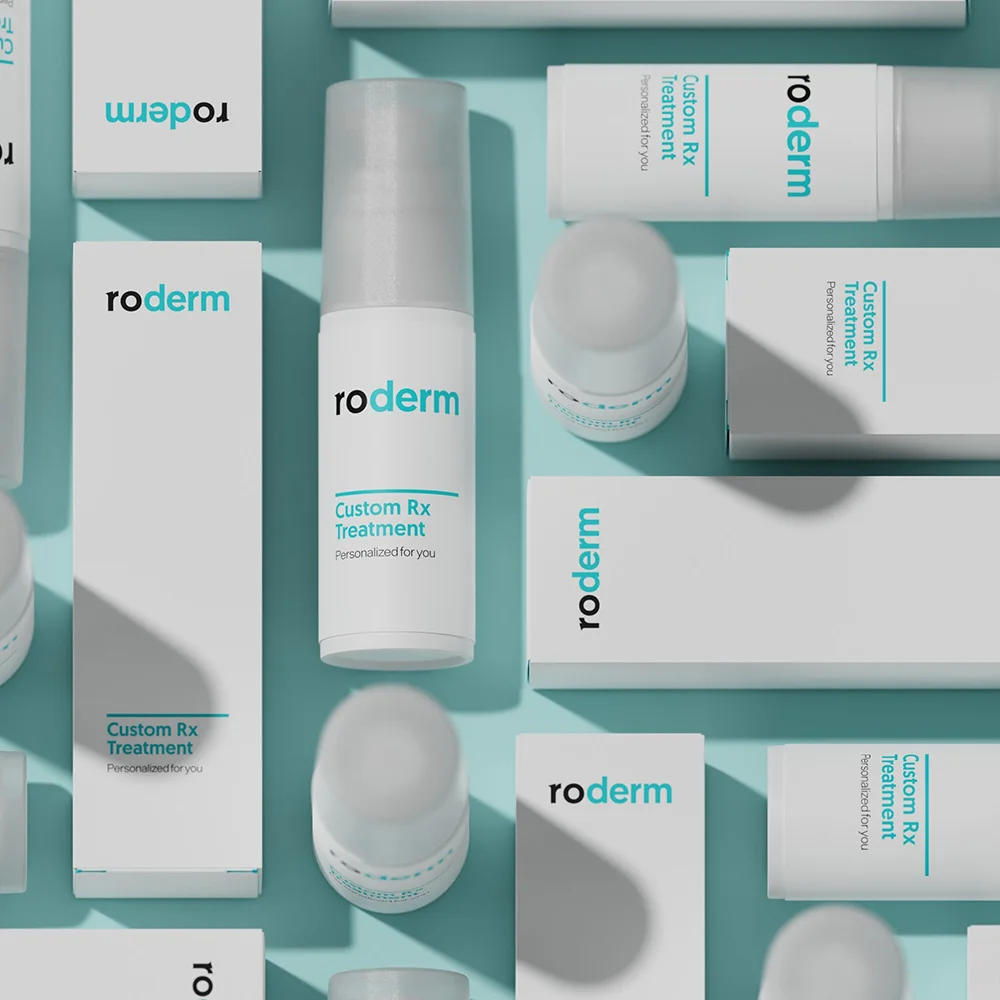Here's what we'll cover
Here's what we'll cover
Testosterone is an important hormone that your body needs to stay healthy. It regulates sex drive, helps maintain muscle mass, and helps produce sperm, among other things. In some cases, like when you have too much testosterone, it may also trigger acne.
Keep reading to learn more about testosterone’s role in acne breakouts and why hormonal fluctuations can sometimes lead to skin problems.
Does testosterone cause acne?
Testosterone can trigger acne by boosting the production of an oily substance in the skin called sebum (Sutaria, 2021).
Sebum comes from your body’s sebaceous glands, and it’s essential for healthy skin. However, too much sebum can increase the risk of inflamed sebaceous glands and lead to acne.
This happens when excess sebum, as well as other substances like dead skin cells, build up in your hair follicles, clogging them and increasing the risk of an acne outbreak. You may only get a few whiteheads or blackheads, or you may develop inflamed and painful cysts, bumps, or nodules (Elsaie, 2016).
Can testosterone trigger acne in women?
Yes. While both sexes make male sex hormones (androgens) such as testosterone, women usually have lower levels of them than men—but these levels can still rise and cause acne breakouts (Uysal, 2017).
In a small study of women aged 18–45, researchers found that 72% of the women with acne had excess male hormones, including testosterone. The most common cause was a condition called polycystic ovary syndrome (PCOS), an endocrine disorder that can cause ovarian cysts, irregular periods, and an increase in androgens (known as hyperandrogenism) (Uysal, 2017; Leon, 2021).
What causes testosterone levels to fluctuate?
Testosterone levels naturally rise and fall throughout life. For example, in women, pregnancy, menstrual cycles, and menopause are linked to various hormonal changes, which can affect how testosterone impacts their skin (Elsaie, 2016). Men see an increase at puberty and a decrease as they age (Zirkin, 2012).
However, severe hormonal acne can be linked to more dramatic elevations of testosterone. The following conditions are known to play a role in or directly boost testosterone levels (Nassar, 2022; Sizar, 2022):
Hyperandrogenism
Adrenal diseases like congenital adrenal hyperplasia or benign or malignant tumors
Ovarian or testicular tumors (this is rare)
Like the medical conditions above, some treatments and supplements can also affect your testosterone levels. These include (Nassar, 2022; Sizar, 2021):
Testosterone replacement therapy (to reverse low testosterone)
Testosterone masculinizing therapy (gender transition) (Park, 2019)
Over-the-counter androgen supplements like DHEA
How do you treat hormonal acne?
Many of the same treatments work for both men and women with hormonal acne.
Treating any underlying hormonal conditions may require seeing an endocrinologist who specializes in hormones. But, if you have mild-to-moderate hormonal acne, the following topical treatments may help reduce breakouts (Elsaie, 2016):
Cleansers with salicylic acid
Topical antibiotics
If you have moderate to severe acne, your healthcare provider may recommend more aggressive approaches to treat acne that combine topicals with oral medications. These may include (Elsaie, 2016):
Anti-inflammatory medications
Oral antibiotics
Oral isotretinoin (Accutane) (avoid if pregnant)
Oral contraceptives (birth control pills can balance hormone levels in women)
Anti-androgen medications (to lower testosterone levels in women)
Laser treatment (Boen, 2017)
Additionally, eating low glycemic foods may help your skin as well. Some studies suggest that a hormone called insulin-like growth factor 1 (IGF-1) can lead to an increase in sebum production and is linked to acne and inflammation. This hormone increases when you eat sugars and high glycemic foods (Elsaie, 2016; Kim, 2017).
Treating acne linked to testosterone therapy
If you are taking testosterone and experiencing acne, your healthcare provider may be able to adjust the dosage or discuss skin treatments to address the acne. For instance, some transgender men going through virilization treatment with testosterone will adjust dosages to lessen acne and other symptoms (Park, 2019).
Other tips for acne-prone skin
A healthcare provider can go over specifics about acne treatments and the best skincare regimen. However, there are some general skincare tips that The American Academy of Dermatology has for those with acne (AAD, 2021):
Wash your face gently, no more than twice a day, and after sweating. Excessive face-washing can remove too much oil from your skin, causing your skin to secrete more oil, making your acne worse.
Skip exfoliating or harsh scrubbing to avoid further inflammation.
Don’t pick your pimples. This can increase inflammation and scarring.
Use non-comedogenic products (sunscreens, moisturizers) to avoid clogging your pores.
Hormonal acne can be unpleasant, but there are ways to treat it. If you think your acne may be caused by hormone fluctuations, like too much testosterone, reach out to your healthcare provider. They can help you figure out if testosterone is to blame and what acne treatment is best for you.
DISCLAIMER
If you have any medical questions or concerns, please talk to your healthcare provider. The articles on Health Guide are underpinned by peer-reviewed research and information drawn from medical societies and governmental agencies. However, they are not a substitute for professional medical advice, diagnosis, or treatment.
American Academy of Dermatology (AAD). (2021). 10 skin care habits that can worsen acne . Retrieved from https://www.aad.org/public/diseases/acne/skin-care/habits-stop
Boen, M., Brownell, J., Patel, P., et al. (2017). The role of photodynamic therapy in acne: An evidence-based review. American Journal of Clinical Dermatology , 18 (3), 311–321. doi:10.1007/s40257-017-0255-3. Retrieved from https://pubmed.ncbi.nlm.nih.gov/28276005/
Elsaie, M. (2016). Hormonal treatment of acne vulgaris: An update. Clinical, Cosmetic and Investigational Dermatology , 9 , 241–248. doi:10.2147/ccid.s114830. Retrieved from https://www.ncbi.nlm.nih.gov/pmc/articles/PMC5015761/
Kim, H., Moon, S. Y., Sohn, M. Y., et al. (2017). Insulin-like growth factor-1 increases the expression of inflammatory biomarkers and sebum production in cultured sebocytes. Annals of Dermatology , 29 (1), 20. doi:10.5021/ad.2017.29.1.20. Retrieved from https://www.ncbi.nlm.nih.gov/pmc/articles/PMC5318522/
Leon, L., Mayrin, J., & Anastasopoulou, C. (2021). Polycystic ovarian disease. StatPearls . Retrieved May 16, 2022 from https://www.ncbi.nlm.nih.gov/books/NBK459251/
Nassar, N. & Leslie, S. (2022). Physiology, Testosterone. StatPearls . Retrieved May 15, 2022 from https://www.statpearls.com/articlelibrary/viewarticle/29996/
Park, J. A., Carter, E. E., & Larson, A. R. (2019). Risk factors for acne development in the first 2 years after initiating masculinizing testosterone therapy among transgender men. Journal of the American Academy of Dermatology , 81 (2), 617–618. doi:10.1016/j.jaad.2018.12.040. Retrieved from https://www.jaad.org/article/S0190-9622(18)33115-3/fulltext
Sizar, O. & Pico, J. (2022). Androgen replacement. StatPearls . Retrieved May 15, 2022 from https://www.statpearls.com/articlelibrary/viewarticle/17525/
Sutaria, A., Masood, S., & Schlessinger, J. (2021). Acne vulgaris. StatPearls . Retrieved May 16, 2022 from https://www.ncbi.nlm.nih.gov/books/NBK459173/
Uysal, G., Sahin, Y., Unluhizarci, K., et al. (2017). Is acne a sign of androgen excess disorder or not? European Journal of Obstetrics & Gynecology and Reproductive Biology , 211 , 21–25. doi:10.1016/j.ejogrb.2017.01.054. Retrieved from https://pubmed.ncbi.nlm.nih.gov/28178574/
Zirkin, B. R. & Tenover, J. L. (2012). Aging and declining testosterone: Past, present, and hopes for the future. Journal of Andrology , 33 (6), 1111–1118. doi:10.2164/jandrol.112.017160. Retrieved from https://www.ncbi.nlm.nih.gov/pmc/articles/PMC4077344/










